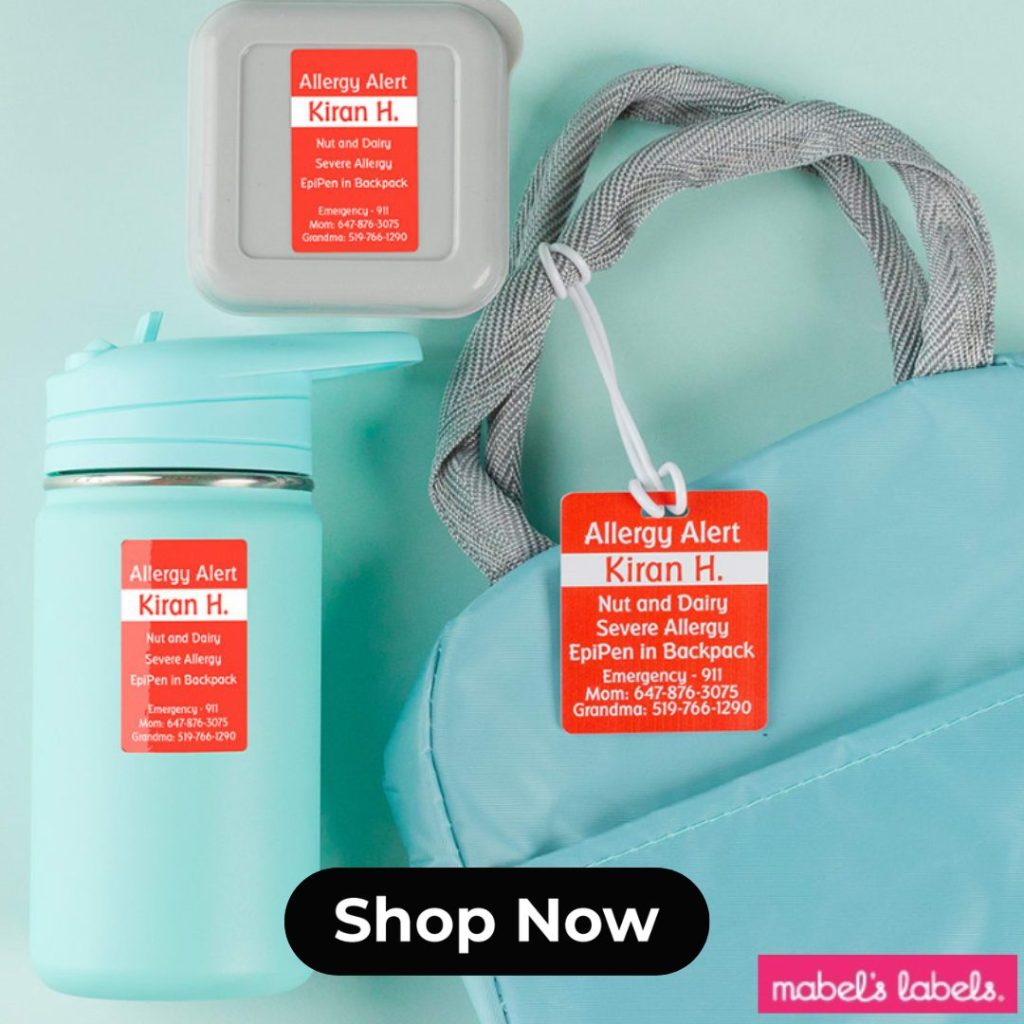Sending your child off to summer camp is an exciting milestone, but it brings with it a lot of anxiety (homesickness!)
But for parents of children with allergies, this anxiety can feel huge. The good news? With the right preparation and a solid Allergy Action Plan, your child can have a safe and memorable camp experience. A well-thought-out plan ensures that everyone involved—from camp counselors to medical staff—knows exactly what to do in case of an allergic reaction. Here is how parents can prepare an allergy plan for Summer Camp that ensures peace of mind.
Choosing an allergy-friendly camp or one that takes food sensitivities seriously is key but it’s not always accessible for everyone. When selecting a camp, consider things like staff training, emergency protocols, and whether they can accommodate your child’s specific needs. It’s also important to weigh the camp’s location, cost, and activities to ensure it still aligns with your child’s interests and your family’s budget.
What is an Allergy Action Plan (AAP)?
An Allergy Action Plan outlines your child’s allergies, symptoms, and emergency protocols. It serves as a guide for camp staff, ensuring they know exactly what to do in case of an allergic reaction. Without a plan, even the most well-intentioned camp staff might not know how to handle an emergency properly. Having a structured, easy-to-follow guide minimizes risks and ensures quick and effective action, and this alone gives parents peace of mind.
Talk to the Camp Director: How to Communicate Effectively About Your Child’s Allergies
Before signing up for camp, you must have a detailed conversation with the camp director or medical staff about your child’s allergies. Every camp operates differently; some may be better equipped than others to handle food and environmental allergies. Having an open dialogue allows you to gauge their level of preparedness and ensure they have the right policies in place to keep your child safe.
Here are some important questions to ask your child camp about their allergy policies:
- Do you have experience handling severe allergies?
- Is the kitchen equipped to prevent cross-contamination?
- Are staff trained to recognize and respond to allergic reactions?
- Where is the nearest medical facility?
Work with Your Child’s Doctor
Your child’s doctor is an essential resource in crafting your kids’ Allergy Action Plan. They can provide medical guidance tailored specifically to your child’s needs, ensuring all necessary precautions are covered. Involving your doctor also ensures the severity of their condition is taken seriously by the summer camp, providing an added layer of support and preparedness.
A well-documented plan from your doctor provides an added layer of support and preparedness and helps camp staff with protocol specific to your kiddo.
Your Allergy Action Plan should include:
- A list of allergens (e.g., peanuts, tree nuts, dairy, insect stings, etc.).
- Symptoms to watch for (mild to severe reactions).
- Medications and dosages (antihistamines, epinephrine, inhalers).
- Emergency steps to follow in case of a reaction.
- Doctor’s contact information for further instructions.
Allergy-Safe Essentials to Pack for Summer Camp
Packing properly for camp is just as important as creating a plan. The right supplies ensure that your child—and those caring for them—have what they need in the event of an allergic reaction. Having a well-prepared allergy kit also provides peace of mind and can help camp staff respond quickly if necessary.
Here’s what to include in your child’s camp bag:
Multiple epinephrine auto-injectors (keep one with your child and one with staff).
Antihistamines (if prescribed).
An inhaler (if needed for asthma).
Allergy-friendly snacks.
Mabel’s Labels Allergy Labels to mark food containers, water bottles, and medical supplies. 
A well-stocked allergy kit ensures camp staff has everything they need in an emergency.
Empower Your Child to Speak Up for Their Needs
While parents and camp staff play critical roles in keeping kids safe, children should also be taught to advocate for themselves. Teaching your kids how to communicate about their allergies helps build confidence and independence. A child who knows how to recognize and speak up about their allergies is less likely to be put in a dangerous situation.
Encourage your child to:
-
-
Politely refuse foods without clear ingredient labels.
Teach your child to say, “No, thank you,” and explain their allergy if needed. Encourage them to ask an adult for help when unsure. -
Always carry their emergency medications.
>Make it a habit to keep their EpiPen or antihistamines in a small, easy-to-access bag, and remind them to check it before heading out. -
Alert an adult at the first sign of a reaction.
>Encourage them to trust their body and speak up immediately if something feels off—early action can prevent a serious reaction. -
Use an EpiPen if necessary (with supervision).
>Ensure they understand when and how to use an EpiPen, practicing with a trainer device so they feel prepared in an emergency. -
Encourage your child to talk openly with friends they trust about their allergy.
>Teach them to share what foods are unsafe and how friends can help, like reminding them to carry their EpiPen or speaking up in tricky situations. This builds strong friendships and adds an extra layer of safety.
-
Provide Clear Instructions for Camp Staff About Your Child’s Allergy
It’s important to make sure that camp staff fully understands your child’s allergies and how to handle an emergency. This includes knowing what foods or environmental triggers to avoid, recognizing symptoms of an allergic reaction, and having a step-by-step action plan in place. When instructions are clear and accessible, response times are faster and more effective.
Provide them with:
- A printed Allergy Action Plan in multiple locations (nurse’s office, kitchen, counselors).
- A demonstration on how to use an epinephrine auto-injector.
- A list of safe foods and meals.
Ask the camp director about staff training and make sure they review your child’s allergy needs before camp begins. Your child should feel safe at camp starting the first day; with allergies, the learning curve can’t happen once camp has begun. Once camp starts, all staff members should already be well-versed in the plan and action items.
Follow Up & Stay in Touch with The Camp:
Your job isn’t done once camp begins—staying connected with camp staff ensures that your child’s allergy management plan is being followed correctly. Checking in periodically allows you to address any concerns, confirm that safety protocols are in place, and make any necessary adjustments to your child’s action plan.
Once camp starts, check in with staff for updates on:
- Meal planning and snack times.
- Any close calls or minor reactions?
- How your child is managing their allergies.
Check-In With Your Kids About Their Confidence with the allergy plan for camp:
It’s also important to check in with your child and ask how they feel about it. You don’t want your child to not be eating enough because they don’t have confidence in the food or possible contamination, or that they choose to miss out on an activity because they don’t feel the staff are well prepared for an asthma attack. Sometimes, the staff may feel one way, but your child’s comfort level may be different, in which case, this needs to be addressed.
A Safe & Fun Summer Awaits!
Sending a child with allergies to camp can feel overwhelming, but with the right Allergy Action Plan, they can enjoy camp just like any other kid. Preparation, communication, and education are the keys to making summer camp a safe and exciting experience. Taking these steps gives your child the confidence to explore, have fun, and make lifelong camp memories—without the worry. 💙

